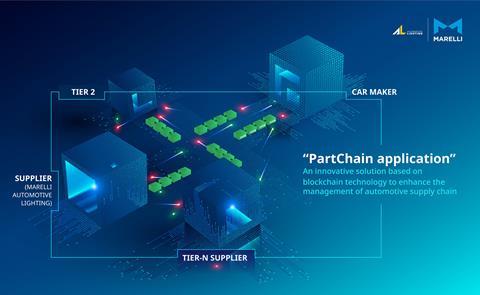At a time when manufacturers are dealing with the impact of Covid-19, Marelli Automotive Lighting is working with the BMW Group on the introduction of blockchain technology to connect suppliers’ and carmakers’ plants to improve the management of automotive supply chains.

The technology has been implemented in a joint project between Marelli, formed last year when Fiat Chrysler Automobiles (FCA) sold its parts unit Magnetti Marelli to Japan’s Calsonic Kansei, and BMW, which recently announced it would expand the use of blockchain technology for the purchasing of components.
Together, the companies have designed and developed the PartChain application, which is being used initially as a pilot focused on the traceability of headlamps, rear lamps and lighting modules supplied by Marelli Automotive Lighting to a number of BMW Group vehicles.
Three Marelli Automotive Lighting plants located in Jihlava (Czech Republic), Tolmezzo (Italy) and Juarez (Mexico), and two BMW Group plants in Spartanburg (US) and Dingolfing (Germany) were connected through PartChain. Within the first project, the platform is managing the data of more than 100,000 parts and vehicles, according to a Marelli company statement, which said the technology would result in the optimisation of logistics and production costs.
“Ensuring transparency, authenticity, reliability and efficiency in the management of supply chains are crucial goals for all the automotive players,” said Sylvain Dubois, CEO, Marelli Automotive Lighting.
“The increasing complexity of products, in conjunction with globally diversified value chains, are presenting the automotive industry with growing challenges, and technologies like blockchain, which represents the forefront of innovation in this field, brings a crucial contribution to improve the system.”
The next step for the PartChain application will be to ensure a higher data authenticity grade, which limits the risk of counterfeit parts in the supply chain, said Marelli.
Counterfeit parts in the automotive industry will soon be equal to more than the annual gross domestic product of Canada, Brazil or Italy. According to World Trademark Review, the estimated global economic cost of counterfeiting in the automotive industry could reach $2.3 trillion by 2022.
In Europe, it is estimated that €2.2 billion ($2.4 billion) is lost annually to counterfeit tyre sales alone, while counterfeit battery sales effectively steal €180m ($198m) from OEMs.

























![Global[1]](https://d3n5uof8vony13.cloudfront.net/Pictures/web/a/d/s/global1_726550.svgz)














No comments yet